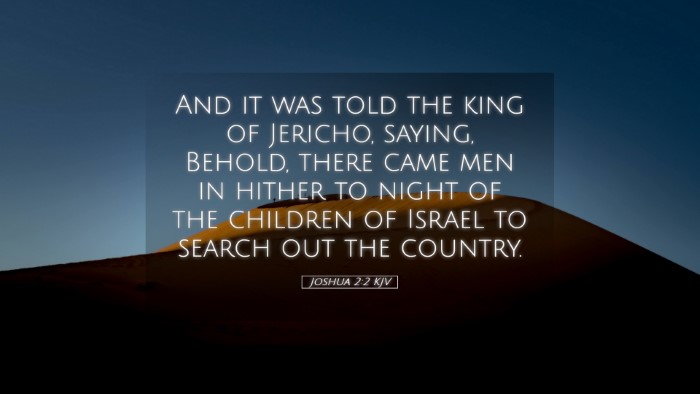Old Testament
Genesis Exodus Leviticus Numbers Deuteronomy Joshua Judges Ruth 1 Samuel 2 Samuel 1 Kings 2 Kings 1 Chronicles 2 Chronicles Ezra Nehemiah Esther Job Psalms Proverbs Ecclesiastes Song of Solomon Isaiah Jeremiah Lamentations Ezekiel Daniel Hosea Joel Amos Obadiah Jonah Micah Nahum Habakkuk Zephaniah Haggai Zechariah MalachiJoshua 2:2
Joshua 2:2 KJV
And it was told the king of Jericho, saying, Behold, there came men in hither to night of the children of Israel to search out the country.
Joshua 2:2 Bible Commentary
Commentary on Joshua 2:2
Joshua 2:2 states, "And it was told the king of Jericho, saying, 'Behold, there came men in hither tonight of the children of Israel to search out the country.' This verse introduces the unfolding narrative concerning Joshua's spies sent into Jericho. The historical and theological implications of this action are profound and reveal much about God's providence and the nature of faith in critical moments.
Overview of the Context
The book of Joshua marks a pivotal transition for the Israelites as they move from wandering in the wilderness to conquering the Promised Land. This transitional moment is not only crucial for Israel's history but also serves as a metaphor for the believer's journey from bondage to freedom. Joshua, as the appointed leader after Moses, embodies strength and courage. His directive to send spies to Jericho signifies strategic planning under God's guidance.
Insights from Matthew Henry
Matthew Henry points out that the actions of the spies are significant for several reasons:
- Discretion and Strategy: Sending spies exemplifies prudence; it reflects the need for careful consideration in the face of overwhelming challenges.
- Faith in Action: The act of sending spies mirrors the faith of Israel in God's promise to deliver the land. Despite the daunting task, the Israelites move forward, trusting in God's assistance.
- The Role of Rahab: Henry elaborates on the encounter with Rahab, emphasizing God’s sovereignty and grace. Rahab, a Canaanite, plays a critical role in the faith story, highlighting the inclusiveness of God’s plan for salvation.
Insights from Albert Barnes
Albert Barnes provides a more detailed exposition of the political situation in Jericho:
- Jericho's Reputation: Jericho was known as a fortified city; its walls were considered impenetrable, which made Israel’s mission daunting but also a testament to God’s power over seemingly impossible odds.
- Intelligence Gathering: The act of spying is seen as a necessary step in military strategy, reflecting the human responsibility in the fight for God's promises.
- Consequences of Secrecy: Barnes notes that the spies' mission is quickly discovered, representing the tensions between God’s plans and human intentions, and illustrating that nothing escapes the watchful eyes of those in authority.
Insights from Adam Clarke
Adam Clarke's commentary adds depth with historical context:
- Cultural Implications: Clarke mentions that the news of the Israelite spies arriving would have created alarm, as it signified impending invasion, thus providing insight into the psychological warfare inherent at such a juncture.
- Spiritual Symbolism: Clarke remarks on the notion that spies represent the faith of the people and the necessity of active engagement in achieving divine promises. This ties into the broader theme of faith accompanied by works.
- Rahab’s Recognition: The eventual interaction of the spies with Rahab highlights the idea that faith can be found in the most unexpected places, demonstrating how God's plans unfold beyond human understanding.
Theological Implications
The narrative surrounding Joshua 2:2 offers rich theological insight:
- God’s Sovereignty: This verse is a reminder of God’s control even in seemingly chaotic situations. The spies's discovery serves to advance God's plan despite human efforts to thwart it.
- Faith and Courage: The actions of both Joshua and the spies illustrate a profound belief in God, encouraging believers to trust and act even when faced with formidable challenges.
- Inclusiveness of Salvation: The mention of Rahab foreshadows the Gospel's expansive nature, where God’s grace is not limited by nationality or past sins but is offered to all who believe.
Conclusion
In summary, Joshua 2:2 is a verse replete with insight and profound lessons for pastors, theologians, and students of the Bible. It invites a reflection on the dynamics of faith, leadership, and God’s unwavering sovereignty in the face of opposition. As believers engage with this text, they are reminded of the vital relationship between faith and action and the assurance that God's plans encompass all humanity.


